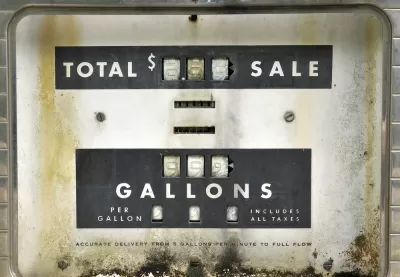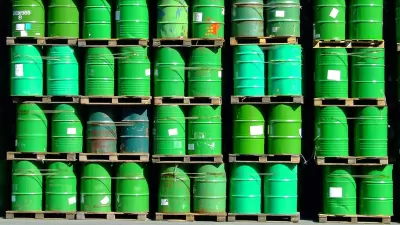Memorial Day gas prices are the highest since 2014, The rising price of gas has already negated the tax savings from last year's tax cuts bill for low-income Americans. Retaining fuel economy standards would increase energy security.

President Donald Trump was so confident that his pro-fossil fuel, deregulatory policies would increase American oil production that he replaced the long-held term, "energy independence," created by President Richard Nixon in November 1973 when the country was in the throes of the first Arab oil embargo, with the newly minted "energy dominance" in June 2017. And production has increased, primarily due to technological advances and increased market prices. A new record was set in the last week of April of 10.619 million barrels per day, surpassing the prior record of 9.6 million b/d set in 1970.
But increasing U.S. oil production doesn't stop global oil prices from increasing, and by extension, gasoline prices for American motorists. Average U.S. gas prices on May 27 were $2.97 per gallon according to AAA. While nearly 20 percent lower than Memorial Day 2014, it was the highest price since then for the holiday weekend that is considered the kickoff of the summer driving season:
| Previous Memorial Day Weekend | Average Price National Gas Price |
| May 22 – May 26, 2014 | $3.65 |
| May 21 – May 25, 2015 | $2.74 |
| May 26 – May 30, 2016 | $2.32 |
| May 25 – May 29, 2017 | $2.37 |
Courtesy of AAA Newsroom
"Today’s increasing pump prices are a further illustration that shale’s extraordinary growth is not a panacea and will not insulate U.S. consumers against global oil market volatility," writes Matt Piotrowski for The Fuse, an energy news and analysis site supported by Securing America’s Future Energy (SAFE), on May 22. “U.S. shale cannot solve the current oil supply problems,” said analysts at Goldman Sachs.
Gas prices are negating the tax cuts for low-income Americans
The rise in gasoline prices is affecting household disposable income and offsetting a portion last year’s individual tax cuts. A SAFE analysis estimates that if pump prices rise by another 55 cents to $3.50/gal, the tax cuts—which give back $122 billion—would be fully negated by the added fuel costs.
That's already happening "[i]f you are in the bottom 20 percent of Americans in income," reports Phillip Bump of The Washington Post on May 22. However, it is middle-income Americans that are most affected by gas prices, adds Bump, shedding some light as to why gas taxes are so difficult to hike.
The Bureau of Labor Statistics compiles data looking at how much households spend on gasoline. On average in 2016, consumers spent the equivalent of a bit over 3 percent of their household incomes on gas. That wasn’t uniformly the case; wealthier consumers spent a lower percentage of their incomes on gas even as they bought more of it. The highest percentage spent was by middle-income Americans.
While Trump may take some credit for his deregulatory policies boosting oil production, he must also take some responsibility for the rising oil prices due to his decision to scrap the Iran nuclear treaty, potentially adding $7 to a barrel of oil.
Pitowski points to another policy implemented by the Trump administration that makes American motorists more insecure as oil prices increase. Similar to the decision to walk away from the Iran agreement, Pitowski points to fuel economy standards set in 2012 that Environmental Protection Agency Administrator Scott Pruitt intends to roll back.
Now that gasoline prices continue to increase, implementing solutions to reduce oil dependence and countering OPEC’s actions take on greater urgency. One response is to modernize and strengthen fuel economy standards during the current Mid-Term Evaluation. As SAFE pointed out in a recent report, using existing driver assist and autonomous vehicle (AV) technologies could potentially bring about some 18–25 percent system-wide fuel economy savings.
The bottom line is that increasing domestic oil production doesn't prevent oil prices from increasing. As SAFE cited in the aforementioned report on fuel economy standards, it "hasn’t changed the nature of our oil dependence or our energy insecurity.”
Prior Memorial Day weekend posts on gasoline prices and driving
-
May 30, 2016:
When compared to past Memorial Day weekends, it's the lowest since 2005, but the highest for the year, and by no coincidence, the highest amount of travelers will take to the roads since the same year.
-
May 26, 2015:In addition to record travel this Memorial Day, the U.S. DOT reports that March broke the record for the most vehicle miles traveled (VMT). Gas prices, though rising since late March, are predicted to drop and remain low through the end of 2015.
FULL STORY: U.S. Consumers Grapple With High Gasoline Prices Heading Into Summer Driving Season

Study: Maui’s Plan to Convert Vacation Rentals to Long-Term Housing Could Cause Nearly $1 Billion Economic Loss
The plan would reduce visitor accommodation by 25,% resulting in 1,900 jobs lost.

North Texas Transit Leaders Tout Benefits of TOD for Growing Region
At a summit focused on transit-oriented development, policymakers discussed how North Texas’ expanded light rail system can serve as a tool for economic growth.

Why Should We Subsidize Public Transportation?
Many public transit agencies face financial stress due to rising costs, declining fare revenue, and declining subsidies. Transit advocates must provide a strong business case for increasing public transit funding.

How to Make US Trains Faster
Changes to boarding platforms and a switch to electric trains could improve U.S. passenger rail service without the added cost of high-speed rail.

Columbia’s Revitalized ‘Loop’ Is a Hub for Local Entrepreneurs
A focus on small businesses is helping a commercial corridor in Columbia, Missouri thrive.

Invasive Insect Threatens Minnesota’s Ash Forests
The Emerald Ash Borer is a rapidly spreading invasive pest threatening Minnesota’s ash trees, and homeowners are encouraged to plant diverse replacement species, avoid moving ash firewood, and monitor for signs of infestation.
Urban Design for Planners 1: Software Tools
This six-course series explores essential urban design concepts using open source software and equips planners with the tools they need to participate fully in the urban design process.
Planning for Universal Design
Learn the tools for implementing Universal Design in planning regulations.
Ascent Environmental
Borough of Carlisle
Institute for Housing and Urban Development Studies (IHS)
City of Grandview
Harvard GSD Executive Education
Toledo-Lucas County Plan Commissions
Salt Lake City
NYU Wagner Graduate School of Public Service




























